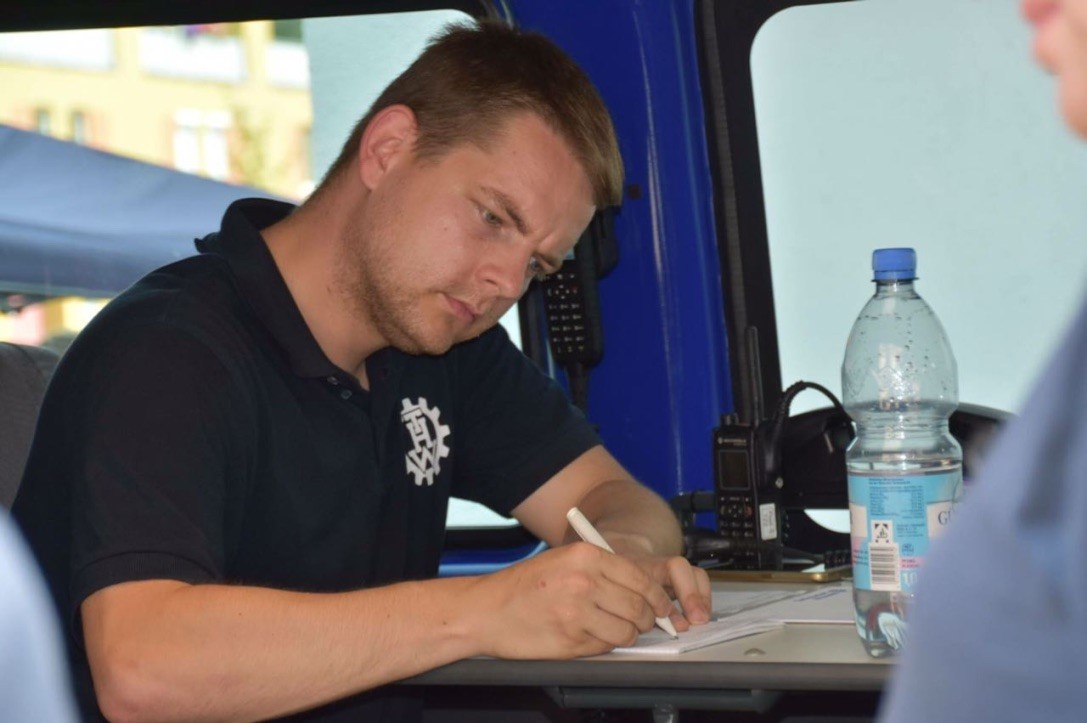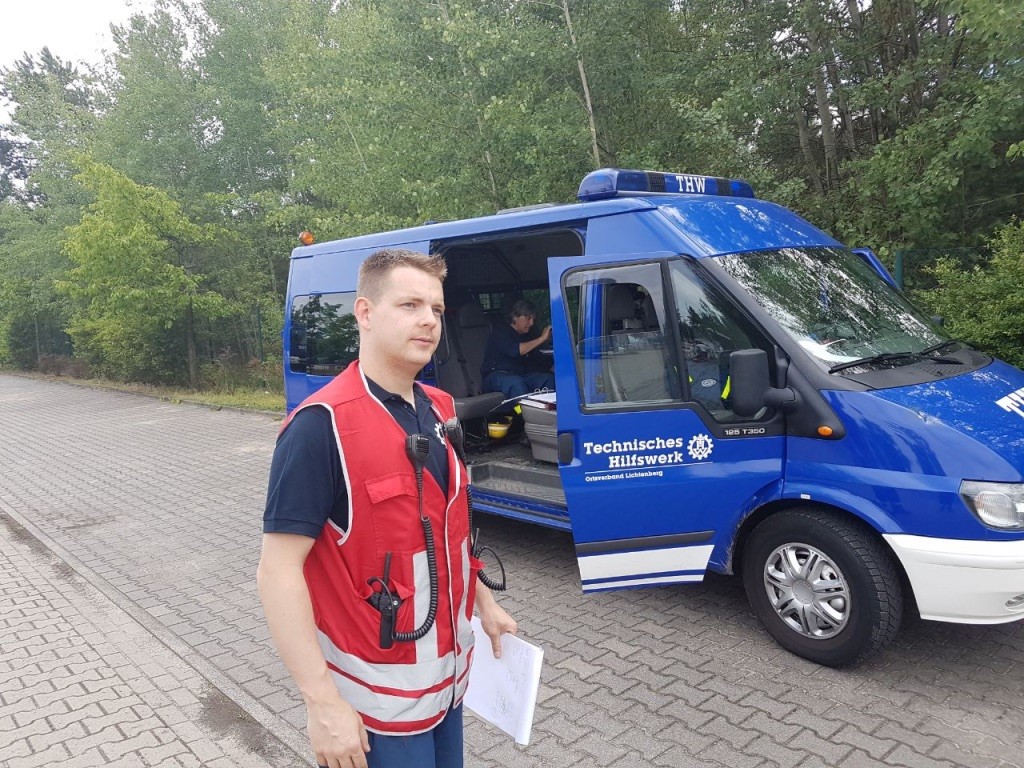15.05.2023 | Guest contributions
Sebastian Paroch erzählt uns seinen Weg
It all started with a letter from the German Armed Forces in 2004: Sebastian Paroch has now been a volunteer for 18 years. After many years of volunteering, he has been working full-time at the THW’s Berlin regional office for two years. But how did this come about? What qualifications did he acquire, what experiences did he have on his “volunteer path”? And what does the Bundeswehr actually have to do with it? We spoke to Sebastian Paroch (38) about his three lives and his journey from voluntary to full-time work.

A roundabout route to volunteering
In Sebastian Paroch’s case, it was neither his family nor his circle of friends that persuaded him to take up voluntary work. Basically, it was a pragmatic decision for professional reasons: Sebastian worked in a small company after completing his training as an IT specialist for application development. In 2004, he was contacted by the German Armed Forces: Sebastian was to be called up for military service. Compulsory military service still existed at the time and Sebastian would have risked his permanent position in the small company by serving in the army.
The alternative after extensive internet research? The “alternative service in civil protection”. He signed up for six years with the THW local branch in Berlin-Lichtenberg. He had to complete 120 hours per year – so he had found a way to continue his regular work. But Sebastian never expected that his decision at the time would turn his (professional) life upside down.
The decision to join THW
“I found working with technology and all the opportunities really exciting,” says Sebastian – and the mood was right from the preliminary interview. He felt comfortable right from the start and began his basic training. The start of a successful “career in volunteering”: After his own basic training, he supervised the new basic trainees, was a helper in the specialist lighting group and a helper in a rescue group. In the last of these, he was appointed squad leader. Finally, he became a helper in the platoon squad of a technical platoon. Here he first became a platoon leader and later a platoon commander. He has now held this position for almost ten years. But Sebastian didn’t just get his start as a volunteer: He also made a fresh start professionally after five years in the IT sector.
“I always say: I have three lives”
Sebastian joined the Berlin police in 2009. He worked in this profession – including postgraduate studies for the higher service – for twelve years. In addition to his voluntary work in the THW, he was also involved in the youth group of the police union during this time, and later in various district groups. In 2021, chance had a hand in it again: just as he was finishing his studies with the police, there was a vacancy at the THW regional office in Berlin. The regional office manager at the time approached him and asked if he would like to apply.
His first reaction? “Up to that point, I had never considered working full-time at THW, but I found it an exciting challenge – and I like to look at things from all sides.” In the end, he decided to give it a try.
 The tasks in the main office
The tasks in the main office
But how easy was it for him to switch from an honorary to a full-time position? “As a trained platoon leader, it was particularly easy for me to familiarize myself with the main office and the operations department.” He also benefited from his “first life” as an IT specialist in the field of information and telecommunications. And more than a decade in the police force prepared him to “understand the THW authority”. The biggest difference to his voluntary work? Less operational work, more administrative. You also have to accept that some processes require a lot of administrative work in order to achieve the goal.
“A change is definitely worth it”
His new job title in the main office: Operations Officer at the THW regional office in Berlin. His main task is coordinating operations, i.e. preparing, carrying out and following up on operations in the Berlin regional area. His responsibilities extend to the areas of operations, equipment, information and telecommunications as well as testing. Seven employees support him in his area of responsibility. But anyone who thinks Sebastian no longer has time for voluntary work in his main job is mistaken: he continues to perform his voluntary duties as a platoon leader, and since 2021 he has also been deputy state speaker for Berlin and occasionally a guest lecturer for various courses at the THW training centers. What started as a pragmatic solution in favor of the profession at the time has now lasted 18 years. Sebastian’s conclusion: “I haven’t regretted a single year so far.”
Tips for those looking to switch
Sebastian’s tip for anyone interested in switching from voluntary work to a career: “Try to take a holistic view. There is a difference between pursuing my hobby as a volunteer and earning my living with my full-time job.” You should definitely think carefully about the change. In a full-time position, for example, you are subject to requirements that would not have played a role in voluntary work. On the other hand, you get insights that you didn’t have before – and therefore an understanding of certain processes. Another plus point of his change: the acceptance and support from the volunteers: “After all, you are one of them and usually know what you are talking about.”
But how does this 100% commitment to THW affect his work-life balance? In addition to his full-time job, Sebastian volunteers around 350 hours a year. He takes a pragmatic view of the whole thing: “Volunteering always takes up as much space in your life as you are prepared to give.” He says of himself that he is “occasionally too busy” – but the response from his family and circle of friends has been consistently positive. Everyone has great respect for his commitment in both full-time and voluntary work. With this level of commitment, it is hardly surprising that he is also continuing his education while working: This year, he plans to complete his Master of Arts in Security Management – perhaps the step into life number four!